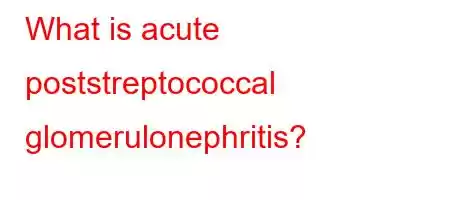Object What is Acute Poststreptococcal glomerulonephritis?
Contents
What is Acute Poststreptococcal glomerulonephritis?
Acute poststreptococcal glomerulonephritis (APSGN) is the most common postinfectious glomerulonephritis of childhood. It often follows throat and skin infection. Macroscopic or microscopic hematuria, edema, azotemia, and hypertension are the main clinical findings.
What are the complications of glomerulonephritis?
Possible complications of glomerulonephritis include: Acute renal failure: loss of function in the filtering part of the nephron, waste products can cause rapid accumulation. Chronic kidney disease: The kidneys gradually lose their filtering ability.
What is AGN disease?
Acute Gomerulonephritis Acute glomerulonephritis (AGN) is an acute inflammation of the glomeruli. It is a clinical syndrome. Typical presentation findings consist of macroscopic hematuria, hypertension, and edema. Poststreptococcal glomerulonephritis is the most common cause of AGN in children. , is a kidney disease with an increase in the amount of nitrogen breakdown products (creatinine and urea) in the blood and high blood pressure.
What does Apsgn mean?
Acute poststreptococcal glomerulonephritis (APSGN) develops after streptococcal infections and It is a common inflammatory disease of the glomeruli caused by the immune mechanism. It is one of the most common causes of childhood glomerulonephritis.
What causes oliguria?
Renal oliguria is Acute Renal Failure. Urine density is close to the density of blood. Postrenal oliguria occurs as a result of narrowing of the urinary tract. The most common cause is prostate enlargement or prostate cancer in men.
How does nephrotic syndrome go?
Steroid therapy: Prednisolone (steroid), remission (improvement) in nephrotic syndrome is the standard treatment method. Most children respond to this drug. Edema and protein in the urine disappear within 1-4 weeks (protein-free urine is considered remission).
What does FSGS mean?
Focal segmental glomerulosclerosis ( FSGS) is a common histological finding of glomerular damage due to various causes. In the early stages of the disease, only some glomeruli are segmentally affected, while other glomeruli are normal.
Why is nephritic syndrome?Nephrotic syndrome does not define an independent disease. Rather, it is a collection of symptoms and complaints that are caused by damage to the kidneys. It is usually caused by damage to the structures responsible for filtration in the kidneys in the form of glomeruli, blood vessel balls.
What is the difference between nephritic and nephrotic syndrome?Nephritic syndrome is accompanied by blood in the urine. The patient's complaint of admission to the hospital may be hypertension or directly renal failure. In nephrotic syndrome, on the other hand, hospital admissions are mostly due to edema. Edema may not be present in nephritic syndrome.
What is Ain medicine?
Acute interstitial nephritis (AIN), which causes acute decrease in glomerular filtration rate and presents with inflammatory infiltrates in the renal interstitium. is a renal lesion. Medications are the most common cause of AIN.
Read: 188


